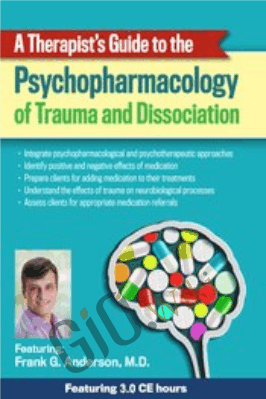A Therapists Guide to the Psychopharmacology of Trauma and Dissociation – Frank G. Anderson
A Therapists Guide to the Psychopharmacology of Trauma and Dissociation – Frank G. Anderson Download. Even though you may not be a prescriber of medication…
Overview
Discover the Best Learning with A Therapists Guide to the Psychopharmacology of Trauma and Dissociation – Frank G. Anderson
WisMentor is your ultimate destination for online learning. Explore "A Therapists Guide to the Psychopharmacology of Trauma and Dissociation – Frank G. Anderson" by top authors and instructors, designed to transform your skills and career. Start now and unlock your potential!
Salepage check: A Therapists Guide to the Psychopharmacology of Trauma and Dissociation
Author: Frank G. Anderson

Let’s face it – treating trauma is hard work and it’s not always clear what needs to be done. Dysregulated nervous systems, co-morbidities, and a myriad of psychotherapeutic and psychopharmacological options often make it difficult to reach the desired goals for your clients.
Even though you may not be a prescriber of medications, it’s essential that you have a thorough understanding of the effects medication has in treating trauma.
Watch world renowned trauma expert Frank Guastella Anderson, MD, in this recording as he guides you through the essentials of Psychopharmacology related to the treatment of Trauma and Dissociation.
Dr. Anderson will teach you how to:
- Integrate psychopharmacological and psychotherapeutic approaches
- Identify positive and negative effects of medication
- Prepare clients for adding medication to their treatments
- Understand the effects of trauma on neurobiological processes
- Assess clients for appropriate medication referrals
Improve your outcomes through the understanding and application of the interplay between medications, psychotherapy and trauma.
- Integrate psychopharmacological and psychotherapeutic approaches in the treatment of trauma and dissociation.
- Identify the positive and potentially negative effects of psychoactive medication interventions related to trauma treatment.
- Prepare clients effectively for the implementation of psychopharmacological adjuncts to psychotherapy.
- Relate the neurobiological effects of trauma to the dysregulation of neurotransmitters and the use of mitigating medications.
- Assess therapeutic indications for appropriate medication referrals.
- Effectively approaching traumatized clients with medication supports
- Classification of the different types of trauma
- Normative responses
- Iatrogenic risks of rapid psychopharmacological treatment
- Introduction to Internal Family Systems (IFS)
- Working with “parts of self” and medication interventions
- Primary types of parts
- Therapists’ role in medications – facilitating compliance
- Indications for medication referrals
- Integrating IFS with medication management
- Video case example – securing parts agreement and clarifying expectations
- Neuroscience and the neurobiology of PTSD
- Neural networks and neural integration
- Fear response circuitry – normal and disrupted function
- Neurotransmitters and medications
- Specific effects of most commonly used medication interventions
- Treating Acute Trauma
- Current psychopharmacological research and new directions
- Negative effects of benzodiazepine use
- Treating PTSD
- Indicated medications and common side effects
- Psychedelic assisted psychotherapy
- Enhancing self-compassion and reducing defenses
- Limitations of current research
- Hormones and PTSD
- Polyvagal theory and Dissociation
- Differentiating ventral and dorsal parasympathetic function
- Treating Dissociation – applications of atypical antipsychotics
- Medications new to the market
- Psychosis, Bipolar Disorder and Trauma – Co-morbidities and Trauma
- Use of PRN medications and scheduling
- Discriminating between biological and emotional symptoms
- Sleep disturbances
- Psychotropics used – effects and side effects
- Attention Deficit Disorder – overlap and medication interaction with PTSD
- Substance abuse and indicated medications
- Depression and co-morbid PTSD
- Star-D study results
- Polypharmacy for PTSD symptomology
- OCD
- Alternative treatments for Trauma
About A Therapists Guide to the Psychopharmacology of Trauma and Dissociation – Frank G. Anderson and Our Expert Authors
A Therapists Guide to the Psychopharmacology of Trauma and Dissociation – Frank G. Anderson is part of our extensive collection of over 70,000 premium courses at WisMentor. Created by renowned authors and industry leaders, this course is tailored to provide cutting-edge knowledge and actionable insights.
Why Choose WisMentor?
- 🌟 Access courses from world-renowned authors.
- 📚 Wide range of topics to suit your professional and personal growth needs.
- 💼 Lifetime access and flexible learning options.
Key Features of A Therapists Guide to the Psychopharmacology of Trauma and Dissociation – Frank G. Anderson:
- ✅ Comprehensive content covering essential topics.
- ✅ Evidence-based methodologies and practical examples.
- ✅ Learn at your own pace with expert guidance.
How to Access Your Course?
Getting started is easy:
- 📩 Receive an instant download link via email.
- 🌐 Access your course anytime through your account dashboard.
- 📱 Compatible with all devices for a seamless experience.
Need Help?
Our dedicated support team is here to assist you. Visit our Contact Us page or reach out via email for any queries or assistance.
More from Our Collection:
Don’t miss the opportunity to explore more courses from top authors and enrich your learning journey at WisMentor. Find your next course now and take your skills to the next level.
